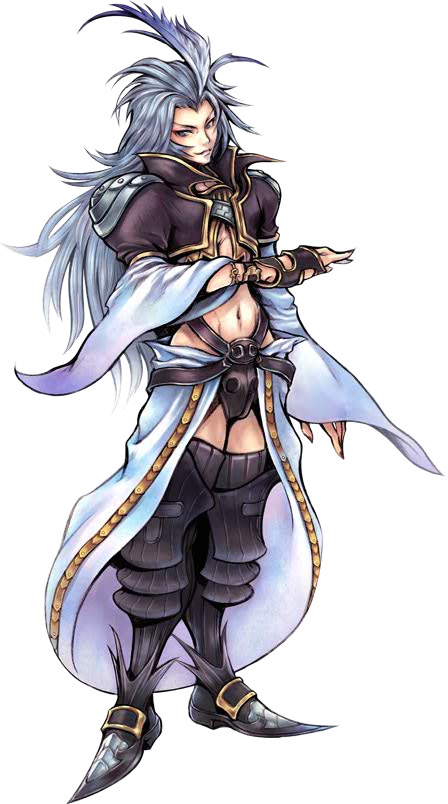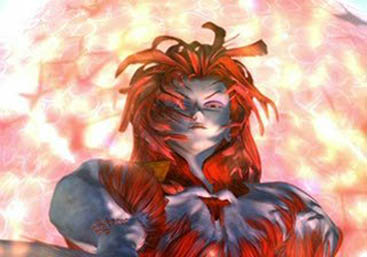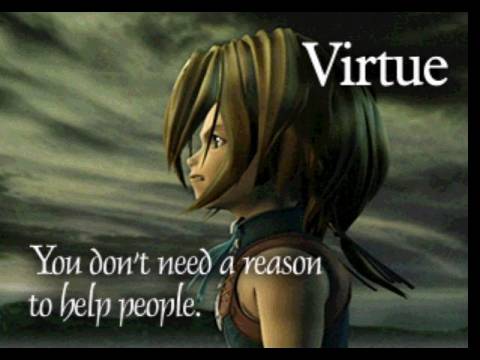Kuja: The Most Human Final Fantasy Villain
By thatpinguino 67 Comments
This essay is an examination of Kuja, the main villain of Final Fantasy IX, in it I outline the aspects of this character that I think make him both a compelling character and, in my opinion, the best villain in the numbered Final Fantasy games. I tried not to structure it as a simple argument about why I like him (because I personally found him quite annoying for much of a 40 hour game). Instead, I have analyzed some of the actions he takes in the game as well as some of the character turns that make him the most well developed and human villain in the series.
Kuja: The Most Human Final Fantasy Villain
The Final Fantasy series is not known for its subtlety. Games in the series often pit a group of plucky teenagers against the forces of pure evil and tell a story about how the power of friendship/trust/love will always conquer over the forces of madness/greed/nihilism. It is rare that the protagonists in this series break from this simple characterization, and even rarer for the antagonists to break from their evil mold. Yet, Kuja, the primary antagonist of Final Fantasy IX, manages to do just that. Kuja is definitely more than a bit unhinged, and he does cause a lot of suffering over the course of the game; however, every one of his actions is an attempt to exceed the limitations placed on him by Garland, his creator. Every one of his actions is driven by his need to be unique, to be an individual when all other members of his race are homogeneous. In a race full of empty vessels he seems to want more; he wants to leave his mark on the world. Thus, he becomes more than a symbol of evil or a one dimensional stereotype, like so many other Final Fantasy villains are; instead he grows to be the best developed and three dimensional of all of the main line Final Fantasy villains.

Kuja’s character development begins with his visual design. Kuja is a member of the Genome race and as such he was likely born with the same short, straight, blond hair and tail that every other member of his race shares. However, the Kuja that the player sees throughout the game has no tail and has long flowing white hair with a flipped, almost feather-like section of hair in the front. Kuja does not resemble the other members of his race in the slightest. Rather, he appears to be the polar opposite of the emotionless and nondescript Genomes that the player encounters on Terra. Kuja’s clothing further separates him from every other character in the game. His elaborate and flamboyant outfit differentiates him from every other being on Gaia and Terra. Kuja’s unique and eccentric visual design helps to establish his fierce individuality as well as his narcissism, the two main characteristics that define him for much of the game.
Throughout the first three discs of Final Fantasy IX Kuja seems to be an ordinary Final Fantasy villain, even the character design that I just outlined seem wrote by series standards. It is only when the player reaches Terra at the end of disc three and enters the dungeon of Pandemonium that Kuja is revealed to be more than a stereotypical villain. Upon entering Pandemonium the player is provided with some dialog between Garland, the mastermind behind much of the strife in Final Fantasy IX, and Zidane, the game’s main character. Garland and Zidane’s discussion reveals much of Kuja and Zidane’s backstory and as a result it provides the player with an entirely different perspective on Kuja. Garland and Zidane say,
You can view Zidane and Garland's conversation here
Garland
"I constructed the Genomes to be vessels for the souls of the people of Terra when they awaken."
"But 24 years ago, I gave life to a Genome that was very much like you."
"His will was too strong to make him into a proper vessel, and I even considered discarding him."
"But then I thought that I should put his strength to use."
"I sent that Genome as my servant, to disrupt the cycle of souls on Gaia."
Zidane
"Yeah, so tell me who he is already!"
Garland
"Do you not yet know? You and he are so much alike."
Zidane
"Alike? I've never met anyone like me..."
Garland
"You judge only by appearances. I mean someone with a soul similar to yours."
"The one I sent to Gaia might also be called your brother..."
"And his name is Kuja."
Zidane
"Kuja!? He's a Genome!? Impossible! He doesn't even have a tail..."
Garland
"He is only hiding it. He denies his own identity."
"He rejects the meaning of his existence and tries to assert his own individuality."
"Don't you see the resemblance?"
Zidane
"Shut up! I'm not like him at all!"
Garland
"He said the same thing when speaking about the other Genomes: 'I'm not like these guys.'"
In this conversation Kuja’s entire character is reworked. Until this point Kuja was a sadistic narcissist who killed for no apparent reason. At best one could only ascribe the most boilerplate of motivations to him: perhaps he wanted power or world domination like Sephiroth or Ultimecia, or perhaps he was simply insane the entire time like Kefka. However, Garland does not describe him as a mad man or a murderer; he does not even describe him as a mastermind. Kuja is instead framed as a rebellious adolescent; he is much more gifted than the people around him and he wants to be more than a puppet or a tool. Kuja “rejects the meaning of his existence and tries to assert his own individuality;” he refuses to allow his life to be limited by Garland or anyone else. Kuja may act callously and selfishly, but his true goal was to defeat Garland and exceed the limitations placed on him. He wants the right to determine his own future, a right that all humans want, and a right that had been denied to him since birth.
The earlier exchange between Zidane and Garland does a lot to humanize Kuja and ground his otherwise wholly inhuman actions; however, it is his transformation at the end of disc three and his actions in disc four that transform him from a humanized villain into a tragic hero. At the end of Pandemonium the player must face a series of boss fights culminating in what is ostensibly a final confrontation with Kuja; but, of course, this battle does not end as most battles do. After the player whittles Kuja’s life down to zero, Kuja enters a trance, which is Final Fantasy IX’s version of a limit break, and wipes out the party with a single powerful spell. At this moment Kuja believes that he has finally gained the power to break free from Garland, overtake Zidane, and rule over Terra and Gaia; he believes that a lifetime of ambition and planning will be fulfilled. Yet, at this moment of triumph Kuja is cut down. Garland and Kuja have the following conversation,
You can view the scene here
Garland
"What will you do with such...power?"
Kuja
"Master Garland... You, of all people, should accept defeat gracefully."
[He kicks Garland in the stomach]
Garland
"Gragh!"
Kuja
"How sad... Any last words?"
Garland
"Your power is...meaningless."
Kuja
"..."
[Kuja kicks Garland off the platform]
Garland
"GRAAAHHHHHH!!!"
Kuja
[Turns around to face Zidane & company]
"Now, it's your turn... Should I kill you quickly to show my appreciation for all you've done?"
"Or should I kill you slowly and painfully to show you my love..."
"Oh, I've got a great idea! How's this? I'll make you pillars for my castle!"
"You'll all decorate my castle as a symbol of my eternal kingdom... How do you like that?"
Zidane
"No... Never!"
Garland
"You could never build an eternal kingdom..."
Kuja
"That voice... Garland!?"
"Did you leave something behind?"
Garland
"Do you think a defect like you could last forever...?"
Kuja
"...What? What do you mean!?"
Garland
"I built you to last only until the worthy Genome, Zidane, grew."
"It was too dangerous to let you last any longer than that."
Kuja
"What are you saying...?"
Garland
"There's a limit on your life... You'll be dead soon..."
"Even as I die, you'll have died without ever leaving your mark on the world..."
Kuja
"..."
"H-Ha ha ha... What an interesting lie. You're telling me that my life will end soon?"
"Ha ha ha... Nice try, Garland, but I won't fall for your silly tricks... Garland?"
"..."
"Garland!? Answer me!"
Garland
"You were created to destroy. You are a mortal..."
Kuja
"A mortal...?"
"...I'm finished?"
"I don't believe you! Why would I believe such a silly story!"
"You're telling me that I'll die soon, now that I'm more powerful than anyone?"
"I'm gonna...die!?"
"Lose my soul...?"
"Ha... HAHAHAHAHAHA!"
"What comedy! Zidane, isn't it hilarious!? I'll die just like the black mages I so despise!"
"I single-handedly brought chaos unto Gaia, but in the end, I'm nothing but a worthless doll!"
Vivi [who's off screen]
"Kuja..."
"...Kuja?"
Kuja
"...I won't let it happen."
"I won't... I won't let this world exist without me!"

Kuja is informed that he, in fact, is not like the other genomes, unlike them he is mortal. All of his plans to defy his limitations prove to be limited by the one barrier that he cannot overcome: death. And yet it is important to note that he defied every other limitation presented to him: he defeated Garland, he grew more powerful than Zidane, and he had the ability to rule Gaia and Terra. Kuja is informed that despite twenty four years of playing his hand perfectly, he will still lose the game because he was never told all of the rules. Kuja reacts to this information the only way he knows how, defiantly. He decides to use his new found power to take the world with him.
Kuja’s attempt to destroy the world is fundamentally different from all of the Final Fantasy antagonists that came before him; he does not operate from a position of strength. All of the other villains attempt to either take over the world or destroy it with the plan of ruling or gaining some sort of absolute power; Kuja fits this mold until the end of disc three, however from that point on Kuja is no longer an egomaniac attempting to take over the world, he is a dying man desperate to continue living.
There is a bit of inconsistency with what exactly Kuja is trying to do at the end of the game and so I will present both potential readings. The first reading is that Kuja is so enraged by the prospect of the world existing without him that he elects to destroy all of existence, rather than die alone. This is the reading that one could take if one listened purely to what Kuja himself says to the heroes. Before the final battle with him he says,
"Hmph. You honestly think you can beat me?"
"Even if you do, Gaia's already doomed. Its assimilation by Terra has begun, and the Iifa Tree will incite a cataclysmic destruction of Gaia."
"It's all over for you and your friends."
"See. I win, either way."
He clearly states that his intended goal is to destroy Gaia as he has destroyed Terra. He also makes no mention of any ulterior motives for his actions. He seems to be attempting to destroy everything simply out of spite for the world for exiting without him. This reading would make Kuja another in the Final Fantasy series’ long line of ego-maniacal world-enders. However there remains another reading of his final desperate acts at the end of the game.
The second potential reading of Kuja’s actions is introduced by Necron, the final boss of the game; this odd grim reaper figure appears after Kuja destroys the crystal of life and he states that “Kuja was a victim of his own fear. He concluded he could only save himself by destroying the origin of all things - the crystal.” In this account of Kuja’s actions he is more of a tragic figure rather than a mere selfish nihilist, rather than simply taking all existence with him into nothing Kuja is taking the one option he has left if he is to survive. Deluded as he may have been, Kuja’s intent is not to drag the world with him; it is to take the only option he has to avoid death. He goes much further than any ordinary person would, but the fear of death that he displays and the extent to which he will go to avoid it is wholly human. He thought it was in his power to save his own life so he acted, to hell with the cost. The game is not clear which of these readings is correct; however, I feel the second reading is more consistent with Kuja’s actions during the game’s epilogue as well as the overall tone of the ending of the game as a whole.
You can view part of the game's epilogue here
In the game’s epilogue Kuja is actually offered a bit of redemption in his final moments; it is Kuja’s magic that saves the party after their battle with Necron. After the game’s final battle, as the party escapes from the Iifa Tree, Zidane actually elects to go back for Kuja. Zidane provides his reason for doing this when he says,
"Because..."
"Because I might've done the same thing if I were in his shoes."
"I probably would've fought against you guys and wreaked havoc in Gaia like he did..."
"I know it sounds crazy..."
"...but I know, deep down inside, I have to do this."

In this statement the altruistic and selfless main character, who serves as a moral compass for much of the game, the character whose quote on the game’s title screen is “you don’t need a reason to help people,” admits that if put in Kuja’s situation he may have acted in the exact same manner. He does not completely validate what Kuja did; however, he does put the idea into the player’s mind that even the most selfless of people can become a monster if put through what Kuja endured. He was created for the sole purpose of creating chaos. His creator attempted to replace him shortly after his birth because he was deemed defective. His creator made him mortal when all of his brothers and sisters were immortal. Kuja was made to watch as the man who made him took every step possible to limit his growth and potential. It is no wonder that he became the self-centered and callous individual he became. All these things having been said, the developers did not have to include any moment of redemption for Kuja, almost every other Final Fantasy lacks this moment (though Final Fantasy IV does contain some form of redemption for Golbez, that game explains away his evil acts by saying he was under mind control the whole time; thus, none of his evil actions were in fact his own). Had the developers intended for him to be a simple mad man, they could have just allowed him to die in Memoria. Instead they made him a tragic hero by giving him redemption. He was misguided and his actions were brutal, but he is as much a testament to the force of human will as he is a warning of its dangers. This sentiment is communicated to the player directly through a monolog by Mikoto during the game’s epilogue.
Mikoto has a fairly unique perspective on Kuja as she is likely the Genome that Garland created to replace Kuja and Zidane. Mikoto provides the last perspective on Kuja that the player receives when she says,
"Kuja... What you did was wrong..."
"But you gave us all one thing... Hope..."
"We were all created for the wrong reason, but you alone defied our fate."
"We do not want to forget this. We want your memory to live on forever..."
"...to remind us that we were not created for the wrong reason - that our life has meaning."
To her and her people Kuja is a symbol of hope, a symbol of how far the will to be something, to be different, to live, to make your mark on the world, can carry a person. This is the last image of Kuja that the player is provided with. Kuja is not a villain; he is a reminder to his people “that [their] life has meaning.”
Kuja is a far more complex character than he appears at first glance and although much of his dialog and actions throughout the game mark him as a stereotypical villain, he proves to be much more. In the last disc Kuja metamorphoses into a sympathetic, but ultimately tragic symbol of the power of human will and the drive to self-determination. His actions are ultimately damnable, but throughout the entire end of the game his humanity is laid bare and the player is allowed to see just how much depth and range he has.
All quotes were found on http://www.ffwa.org/ff9/script.php

67 Comments